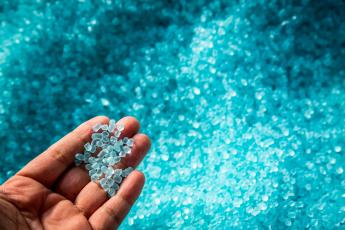With recent plastic waste legislation from New York and New Jersey making headlines, we sat down with AFPM Senior Director of Petrochemicals, Transportation and Infrastructure Rob Benedict to discuss the petrochemical industry’s role in reducing plastic waste, new technological breakthroughs and how AFPM analyzes plastic waste policy proposals.
Misplaced plastic waste is of concern to everyone. To provide some background and context, can you tell us a little about the lifecycle of plastic?
Rob Benedict: Plastic manufacturing starts with monomers — these are the chemical building blocks of plastic. If you use Legos as a metaphor, a monomer would be a single Lego. You can then put those monomer Legos together in different, larger configurations — called polymers — to make finished plastics.
Our members make monomers and fashion them into polymers, the more complex molecules. Polymers largely come from six base petrochemicals: ethylene, propylene, butylenes, benzene, toluene, and xylenes. Certain polymers are fashioned into plastic pellets called resin, which manufacturers mold into plastic products.
So: a monomer is made at our facilities from a hydrocarbon feedstock such as natural gas liquids or naphtha; those monomers are processed into polymers in the form of resins — that’s typically when it leaves our members’ hands — then polymers are made into finished plastics and those plastics are fashioned into a huge number of goods. Consumers use these finished plastic products and eventually dispose of those materials. At this point you get into the waste stream issues including recycling, landfilling and, unfortunately, pollution. That’s where the challenge lies and where AFPM members are using their expertise and partnerships with others along the plastics value chain to help see that plastic waste is handled appropriately.
What are some of the recycling technologies AFPM members and others are using to address plastic waste?
RB: There are several different technologies being used to address the issue of mismanaged plastic waste. The most common is mechanical recycling, where certain types of plastic are shredded and melted back down into plastic pellets, which can then be used to make new products — including things like running shoes, reusable plastic bottles, and even some of the roads we drive on. That’s what is generally referred to as traditional recycling and what people often first think of when they hear the term recycling.
A lesser known and more technically advanced form of recycling is molecular recycling, where you’re not just shredding up plastic waste, but actually using heat (without oxygen) and catalysts to break the plastic all the way back down into the original monomer — that single Lego.

The challenge with molecular recycling (also called advanced recycling or chemical recycling) is that it’s technologically difficult since there is a wide variety of plastics and many of them have chemicals added to give them unique properties. For instance, Mountain Dew likes their green bottles, but the dyes added to make them green must be removed in that molecular recycling process. While our industry has made strides in addressing this challenge, we continue to improve our processes and scale this type of recycling.
There are a lot of different polymers out there, and they are not all created equal when it comes to the ability to chemically or molecularly recycle them. This is an area where our industry and the incredibly smart scientists and chemists who work for AFPM member companies come into play.
Investing to develop the ability to chemically recycle is a way for our industry to continue making things in an ever-more sustainable way. We’re the people who have the technical knowledge to solve some of the most challenging aspects of advanced recycling. We are also the companies that have the ability to figure out how to scale those technologies to help enable widescale use, in turn addressing the issue of mismanaged plastic waste and closing the loop. Our members see a future in this; they’re not just doing this as window dressing, they see this as a critical aspect of their future operations.
Can you share examples of some recent recycling advancements achieved by petrochemical producers?
RB: There have been some really exciting breakthroughs lately in the molecular recycling space as a result of our industries’ investment in that area.
The first polymer to be molecularly recycled was polystyrene, which is also used to make a variety of different plastic products such as disposable plastic cutlery and dinnerware. The petrochemical industry has expanded the recycling of polystyrene and has begun to scale operations. Much of the early breakthroughs related to molecular recycling where focused on polystyrene but that is beginning to change with advancements in recycling other polymers.
Most recently, Chevron Phillips Chemical announced a truly remarkable breakthrough. They announced that they can convert polyethylene — commonly used in packaging film, trash and grocery bags, water bottles, toys, housewares, and even modern combat helmets — back into its original building block monomer for reuse. This isn’t just done on a small scale in a lab; they also announced that this can be done on a large scale making it commercially viable. That is a huge deal because of the number of things made with polyethylene.
Polyethylene is the most widely used plastic in the world and is used in everything from plastic packaging to modern combat helmets. And since most plastic shopping bags are made from polyethylene, commercially scaling production of circular polyethylene from recycled mixed-waste plastics is a tremendous advancement in plastic waste management and shows our industries’ commitment to developing sustainably solutions that cultivate a circular economy.
Does AFPM support policies to help reduce plastic waste?
RB: For decades we have addressed waste at various points in the plastics value chain and are accelerating those efforts both domestically and globally. At the beginning of the value chain, our members are constantly striving for ways to make the petrochemicals and products we produce more easily recyclable. Our members are also partnering with investment firms and Silicon Valley startups to accelerate the pace of advancements in recycling and improvements in waste collection. In addition, our members have invested billions of dollars in the Alliance to End Plastic Waste, a nonprofit organization helping address plastic waste and improve waste management globally, particularly in areas where the majority of plastic waste enters the environment. We recognize that it is a global issue and that we have global responsibilities, even if those issues may be outside of our borders.
There is also the issue of plastic waste policies under development, and AFPM members evaluate proposed plastic waste policies with the following questions in mind:
- Does it take a comprehensive value chain approach that looks at all stages of the plastic lifecycle? Any effective effort must include not only petrochemical facilities but also consumer brand partners, waste companies, recycling companies, local governments and the public.
- Is it data-driven and fact-based? This is an important lens for all AFPM’s policy evaluations.
- Does it foster innovation or stifle it? The ultimate solution to plastic waste depends upon continued technological advancements without regulatory impediments.
- Does it acknowledge the value and benefits plastics provide the world? The current global pandemic has readily demonstrated the value of many single-use plastics.
Domestically, AFPM is advocating for data-driven legislation that fosters innovation while addressing the issue of mismanaged plastic waste. At the federal level we’ve supported the Save Our Seas Act and the Realizing the Economic Opportunities and Value of Expanding Recycling (RECOVER) Act. And AFPM was very encouraged with the White House’s announcement of their strategy for addressing global marine litter — a document that includes several proposals that we’ve supported in other places.
But there are also initiatives like the Break Free from Plastic Act, which calls for radical measures that would be impractical and counterproductive and even stifle innovation in advanced recycling. We’ve also vocally opposed efforts in Canada to classify plastic a toxic material. This reckless designation would create a false public perception that plastics are harmful, ignores the clear benefits plastics provide our society, and most notably is not supported by science.
What about policies specifically to promote advanced recycling?
RB: An important aspect that needs addressing is regulations around waste materials. When current regulations were developed, plastic was viewed as a waste; they did not envision a scenario where trash, used plastic, could be used to make new products. So there will definitely be a need for regulatory changes to allow and promote this kind of recycling.
The COVID-19 pandemic has changed everyone’s lives. What are some of the ways that petrochemicals have helped keep us healthy?
RB: Almost all of the measures we take to prevent COVID contagion are enabled by petrochemicals. N95 masks — you don’t have those without polypropylene. The surgical gowns that protect medical professionals – made from petrochemicals like polypropylene and polyester. PPE, masks, hand sanitizers, disinfectants … they are all made from petrochemicals. That’s why our industry was deemed critical infrastructure by the government in COVID relief. It’s why we’ve had calls with the government to ramp up production. And there are many examples of AFPM member companies ramping up and pivoting production to better provide these critical products to consumers.

Dealing with the COVID pandemic has been hard enough but if we didn’t have plastics and petrochemicals in this challenging time, the situation could be even more dire. This pandemic is showing us how our products can help address that crisis.
Some people say that the petrochemical industry isn’t really interested in addressing plastic waste. What’s your response to that?
RB: First and foremost, addressing the issue of mismanaged plastic waste is the right thing to do. Our members acknowledge the challenge we face and that petrochemical manufacturers have a role in the solution. Further, if we didn’t care about plastic waste, we wouldn’t be spending so much time and money developing recycling technologies that people once thought were impossible. That’s not how our members use their resources — they don’t invest in something unless they believe it’s worth it and they can achieve it. There’s the will to do it, the feeling that we have a responsibility to do it and that we’re the right people to do it. We are also seeing real breakthroughs that are making things that were once thought impossible, a reality.
It’s going to take time and be costly, but for the sustainability of the world and our industry it’s something we need to continue to explore and figure out. It’s going to take the ingenuity of our industry to reverse engineer what they’ve been doing for years and make what is needed to solve these plastic waste issues.
Any closing thoughts?
RB: We as an industry recognize that plastic waste is a problem, and we know we have a role to play in the solution. It’s important to understand that the challenge we face is not an issue of plastic being inherently bad, but rather a mismanaged waste issue. In order to tackle that, we need to incentivize the global recycling market, promote research and development in these areas, and certainly get marine and other misplaced wastes out of the environment.
The American Fuel & Petrochemical Manufacturers (AFPM) is the leading trade association representing the makers of the fuels that keep us moving, the petrochemicals that are the essential building blocks for modern life, and the midstream companies that get our feedstocks and products where they need to go. We make the products that make life better, safer and more sustainable — we make progress.

